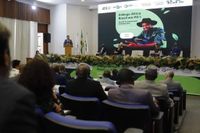On Wednesday, March 19, 2025, a significant gathering occurred in Brazil where ambassadors, experts, and agricultural authorities convened to strengthen agricultural cooperation with African nations. This event, dubbed the "Africa-Brazil Dialogue on R&D&I in Agriculture – Taking International Cooperation to the Next Level," was spearheaded by the Brazilian Agricultural Research Corporation (EMBRAPA), the Inter-American Institute for Cooperation on Agriculture (IICA), and the Brazilian Cooperation Agency (ABC), under the auspices of the Ministry of Agriculture and Livestock (MAPA).
Luís Rua, the Secretary of Trade and International Relations at MAPA, opened the event, underscoring Brazil's pivotal role in the geopolitics of peace and the mutual benefits of knowledge exchange with the African continent. "Africa is a strategic partner both in trade and agricultural cooperation," Rua stated, encapsulating the essence of this international collaboration.
This partnership is not merely symbolic; it has tangible economic implications. In the past three years, Africa has imported a staggering $33.8 billion worth of products from Brazil's agribusiness sector. This extensive trade includes meats, cereals, and sugar, reflecting Brazil's position as a crucial player in the global agricultural market. Moreover, the country saw a remarkable 25% increase in exports to Africa in 2024, further cementing these commercial ties.
At the heart of this burgeoning relationship are policies aimed at enhancing agricultural productivity and food security on both continents. MAPA and EMBRAPA are actively investing in innovative agricultural research and sustainable practices, a necessary evolution in a world facing increasing food production challenges due to climate change and population growth.
Historically, EMBRAPA has revolutionized Brazilian agriculture, turning the previously unproductive Cerrado biome into a powerhouse of agricultural output and sustainable farming solutions. This transformation showcases the significant advancements Brazil has made, providing a model of productivity that can benefit similar regions across the globe.
The focus of the dialogue included efficiency and technological integration in agriculture. Attendees discussed various innovative practices aimed at improving soil fertility and developing crop varieties that are well-suited to varying biomes, which are essential for ensuring food security in the face of environmental challenges.
Future collaboration looks promising as well. In May 2025, agriculture ministers from African countries are slated to travel to Brazil, providing another opportunity to deepen ties and share knowledge. These discussions signal Brazil's commitment to international cooperation and highlight the country's position as a pivotal player in future global agricultural strategies.
The strengthening of Brazil-Africa agricultural cooperation represents more than just trade; it illustrates a growing partnership aimed at tackling shared challenges. With an increasing global population and the pressing nature of climate change, the need for shared knowledge and innovative solutions in agriculture has never been more critical.
As Brazil continues to enhance its agricultural capabilities and extend its influence across continents, these dialogues are essential for fostering mutual growth and ensuring that countries can effectively address food security and sustainability challenges. The growing economic relationship between Brazil and Africa is set to play a crucial role in shaping the future landscape of global agriculture.
In summary, the Africa-Brazil Dialogue not only signifies a commitment to shared growth and innovation in agriculture but also serves as a platform for Brazil to reinforce its role in the complex web of international food security strategies. By leveraging agricultural research and cooperating on sustainable practices, Brazil aims to foster a synergistic relationship with Africa that could benefit both sides for years to come.



